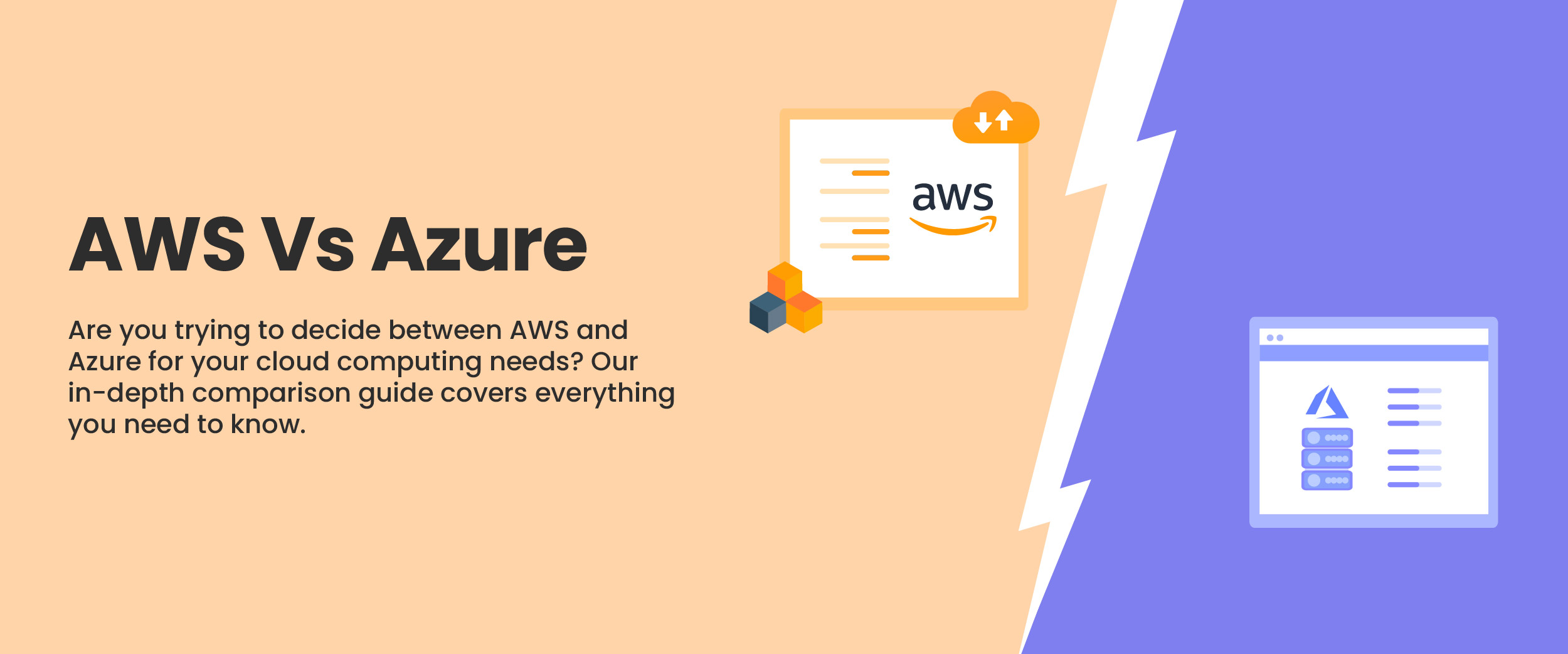AWS Vs Azure: Difference Between AWS And Azure
AWS and Azure help different industries increase their resources, enabling them to build, deploy, and manage applications and services in the cloud. AWS was launched in 2006 and is a part of Amazon. Azure was launched in 2010 and is a part of Microsoft.
Both AWS and Azure are cloud computing platforms that offer a variety of services to assist organizations in scaling their IT infrastructure. They also have extensive documentation, developer tools, and support communities. However, there are significant differences between AWS and Azure. In this blog, we will understand these differences in detail. So, let’s begin.
What is Azure?
Microsoft Azure is a leading cloud computing platform, offering a variety of services, such as computing power, storage, database, networking, and analytics. It provides a highly scalable and configurable cloud computing platform, allowing organizations to rapidly extend their IT infrastructure and resources based on their requirements without investing in expensive hardware or data centers.
What is AWS?
Amazon Web Services (AWS) is another cloud computing platform provided by Amazon that offers a variety of services, such as processing power, storage, database, networking, and analytics. AWS provides a highly scalable and dependable cloud computing platform, allowing businesses to effortlessly increase their IT infrastructure and resources based on their demands without investing in costly hardware or data centers.
Difference Between AWS and Azure
These are some important AWS vs Azure differences.
| Feature | AWS | Azure |
|---|---|---|
| Launch date | Launched in 2006 | Launched in 2010 |
| Type of cloud | Virtual Private Cloud (VPS) | Virtual Network |
| Connection type | Direct connect | Express route |
| Market share | Holds around 32% of the cloud infrastructure services market share | Holds around 20% of the cloud infrastructure services market share |
| Ecosystem | AWS has a sizable partner ecosystem and a software marketplace. | Azure doesn’t have a large ecosystem because there aren’t many Linux solutions available. |
| Availability zone | 61 availability zones | 140 availability zones |
| Pricing model | More granular pricing model, where users pay for individual resources such as compute power, storage, and data transfer | Offers more of a bundled approach, where users select a tier of services that includes a mix of resources |
| Integration with other services | Offers integrations with a wide range of third-party services | Well-integrated with other Microsoft services such as Office 365, Dynamics 365, and Active Directory |
| DevOps tools | Mature DevOps toolset, including tools such as CodeDeploy, CodePipeline, and CloudFormation | Comprehensive set of developer tools, including Visual Studio, Visual Studio Code, and Azure DevOps |
| Machine learning | Offers a diverse range of machine learning tools, including services such as Amazon SageMaker and Amazon Comprehend | Offers a more comprehensive machine learning platform, including services such as Azure Machine Learning and Azure Databricks |
| Database services | Offers a more diverse range of database services, including services such as Amazon RDS, Amazon DynamoDB, and Amazon Aurora | Offers a more comprehensive set of database services, including Azure SQL Database, Azure Cosmos DB, and Azure Database for PostgreSQL |
| Deployment, Monitoring, and Maintenance of Virtual Servers | It uses Amazon EC2 for | It uses Virtual Machines or VM Scale Sets |
| Volume types | The volume types AWS uses are Cold HDD, General Purpose SSD, PIOPs SSD, Throughput Optimized, and HDD. | The volume type used by Azure is a Standard Premium SSD |
| Salary | The average salary for an “AWD Engineer” is approximately $141,757 per year. | The average salary for “Microsoft Azure” ranges from approximately $113,582 per year. |
| Data archiving | Does not offer long-term data archiving and retrieval. | Does not offer long term data archiving and retrieval. |
| Virtual machines | Offers a wide range of VM types and sizes, including general-purpose, compute-optimized, memory-optimized, and storage-optimized VMs | Offers a similar range of VM types and sizes |
| Container services | Offers Amazon Elastic Container Service (ECS) and Amazon Elastic Kubernetes Service (EKS) | Offers Azure Kubernetes Service (AKS) and Azure Container Instances |
| Functions-as-a-Service | Offers AWS Lambda | Offers Azure Functions |
| Analytics services | Offers a diverse range of analytics tools, including Amazon Redshift, Amazon EMR, and Amazon QuickSight | Offers a similar range of analytics tools, including Azure Synapse Analytics, Azure HDInsight, and Azure Stream Analytics |
| Security | Offers a wide range of security tools and services, including AWS Identity and Access Management (IAM), AWS Key Management Service (KMS), and AWS WAF | Offers a similar range of security tools and services, including Azure Active Directory, Azure Key Vault, and Azure Security Center |
| Content delivery network | Offers Amazon CloudFront | Offers Azure Content Delivery Network (CDN) |
| Internet of Things (IoT) | Offers AWS IoT Core, AWS IoT Greengrass, and AWS IoT Analytics | Offers Azure IoT Hub, Azure IoT Edge, and Azure IoT Central |
| Hybrid cloud | Offers AWS Outposts and AWS VMware Cloud on AWS | Offers Azure Stack and Azure Arc |
Some more differences between AWS and Azure are:
| Certification and Training Support | AWS offers certifications that include foundational, associate-level, professional-level, and specialized certifications. | Azure also provides certifications that include fundamental, associate-level, and expert-level certifications. Popular Azure certifications include Microsoft Certified. |
| Networking | It allows you to create a virtual network in the cloud, complete with subnets, route tables, and security groups. | Azure Virtual Network enables you to create and manage private networks in the cloud. It provides similar functionality to AWS VPC, including subnet creation, network security groups, and VPN connectivity. |
| Networking services | IP/Elastic IP/ELBVirtual Private CloudRoute 53ELBFirewall | Automatic IP assignmentLoad-balancingAzure ConnectBalancingEndpoints defined in csdef/cscfg |
| Messaging | Amazon messaging services SQS enables decoupling of components and asynchronous communication, while SNS provides pub/sub messaging for fanout and event-driven architectures. | Azure Service Bus offers messaging patterns and supports both asynchronous and event-driven communication. Azure Event Grid manages event routing service, and Azure Queue Storage allows queuing and storage of messages. |
| Blockchain | AWS Blockchain is a managed service that makes it easy to create and manage scalable blockchain networks by using frameworks like Ethereum and Hyperledger Fabric. | Azure Blockchain allows you to hook, manage, and inspect blockchain networks using various frameworks. It supports Ethereum, Hyperledger Fabric, Corda, and Quorum. |
| Storage services | S3BucketsEBSSDBEFSSQS | Blob StorageContainersAzure DriveTable StorageTablesStorage Stats |
| Support for big data | EBS storage is ideal for handling big data. | Big data has several problems with standard storage, so you require premium storage. |
| Key features | Zero setups, detail monitoring, auto-scaling groups | Startup-friendly, high-performance, low cost |
| Used by | Adobe, Airbnb, Expedia, Yelp, Nokia, Netflix, Novartis | Pearson, 3M, Towers Watson, NBC, Essar, Serko, etc. |
For Example
Assume you’re searching for a cloud provider that provides a complete set of analytics tools. AWS provides data warehousing solutions like Amazon Redshift, massive data processing capabilities like Amazon EMR, and business intelligence tools like Amazon QuickSight. Azure, on the other hand, provides data warehousing tools like Azure Synapse Analytics, large data processing tools like Azure HDInsight, and real-time data streaming capabilities like Azure Stream Analytics. Based on your requirements, you need to choose which set of analytics tools is most suited to your company. To learn AWS, you can opt for an AWS training course, where you can learn various AWS concepts, services, security, etc.
AWS or Azure, Which is Better?
There is no outright pick between AWS vs Azure because it ultimately relies on the individual demands and objectives of a business or organization. Amazon and Azure are both top cloud service providers, each with their own set of strengths and disadvantages.
Here are some things to think about while deciding which service is best for you:
- Integration with Existing Infrastructure: If your company already utilizes a lot of Microsoft tools and services, Azure can be a better match because of its seamless interaction with other Microsoft products like Office 365 and Active Directory. Similarly, if you rely significantly on Amazon services or have previous AWS investments, AWS can be a superior choice.
- Pricing: Both AWS and Azure have a variety of pricing models, but depending on your company’s specific needs, one provider can be more cost-effective than the other. It’s crucial to study the pricing structures of both suppliers and compare the expenses of the services you will be utilizing.
- Service Offerings: While both Amazon and Azure provide a wide range of services, there can be those that one provider does not supply. For example, if your company depends substantially on machine learning, you want to consider which supplier provides the best machine learning services.
- Performance: Both Amazon and Azure feature high-performance computing capabilities, but depending on your company’s exact workload requirements, one provider can outperform the other.
Finally, the choice between AWS and Azure will be determined by your organization’s specific requirements. Before making a selection, it is critical to carefully analyze both services.
Also Read: AWS Interview Questions
Aws Vs Azure: Comparison
Why Some Companies Prefer AWS over Azure
Some businesses prefer Amazon over Azure for a variety of reasons, including:
- A Wider Range of Services: AWS provides a wider selection of cloud computing services than Azure. This can be beneficial for businesses that demand specialized services like machine learning, IoT, or serverless computing.
- Greater Scalability and Flexibility: Amazon is recognized for its scalability and flexibility, which allows businesses to easily grow their infrastructure and alter resources based on demand. This might be advantageous for businesses that have erratic workloads or are undergoing fast expansion.
- Greater Open-Source Support: Amazon has historically provided superior support for open-source technologies like Linux, Docker, and Kubernetes. This can be beneficial for businesses that rely significantly on open-source software.
- Cost-Effectiveness: Based on a company’s unique needs, Amazon can be more cost-effective than Azure. AWS, for example, provides a greater choice of price alternatives that might help businesses save money on cloud computing expenditures.
Netflix, Airbnb, and Expedia are among the organizations that have openly indicated their preference for AWS versus Azure. Netflix, for example, picked Amazon as its major cloud provider because of its scalability, flexibility, and broad range of services.
Why Do Some Companies Prefer Azure over AWS?
There are various reasons why certain businesses pick Azure over Amazon, such as
- Microsoft Tools and Services Integration: Azure is tightly connected with Microsoft tools and services like Office 365, Dynamics 365, and Windows Server. Companies who already use Microsoft products can find it easier to switch to Azure and manage their cloud infrastructure.
- Greater Windows Workload Support: Azure has typically had superior Windows workload support than Amazon, which can be advantageous for businesses that rely significantly on Windows-based applications.
- Better Security and Compliance: Azure provides sophisticated security features and compliance certifications, which can be beneficial for businesses with stringent security and compliance needs, such as those in healthcare, banking, or government.
- Improved Hybrid Cloud Capabilities: Azure has improved its hybrid cloud capabilities, which can be useful for businesses that need to operate apps on-premises and in the cloud.
FedEx, Chevron, and Coca-Cola are among the firms that have openly indicated their preference for Azure over Amazon. Chevron, for example, picked Azure as its major cloud provider because of its high-security features, compliance certifications, and connectivity with Microsoft technologies.
Conclusion
With the above table and the description, it is clear that when it comes to AWS vs Azure, both have their pros and cons. Yet it can be fully concluded that in the battle of AWS vs Azure, as of now, AWS is indeed better. This is because AWS was launched some years before Azure, which puts it much above Azure. This being said, Azure is not at all far behind. Since its launch in 2010, Azure has seen continuous growth ever since. It can be said that in a few more years, Azure will be almost equal to AWS.
FAQs
Both cloud platforms offer a wide range of services viable in different situations with their own pros and cons. To make a wise choice between them, you need to analyze your needs carefully. This evaluation must include factors, like pricing models, the range of services offered, the extent of support received from each ecosystem available worldwide, and scalability potential.
When considering AWS or Azure, consider some important points like skill proficiency levels, industry focus areas, and professional prerequisites. If you wish to elevate your professional prospects, it is important that you analyze which path can most effectively work with your desired task and yield better results.
The AWS and Azure platforms both offer tremendous scope in terms of career opportunities for individuals seeking employment within the tech industry. Selecting either requires taking into account various aspects, such as region-specific demand for cloud experts along with understanding the roles and responsibilities of each platform and their potential for growth prospects over time.
Those who use Microsoft products might find Azures’ integration more natural compared to those who use AWS because of its comprehensive documentation and considerable support from community users.
Professionals skilled in Azure and AWS may find that their pay scales vary based on several factors like experience level, location, job role type, and industry demand. Both platforms provide competitive salaries; however, conducting thorough research through salary surveys or listing jobs can provide a better understanding of today’s overall pay scale accurately.






